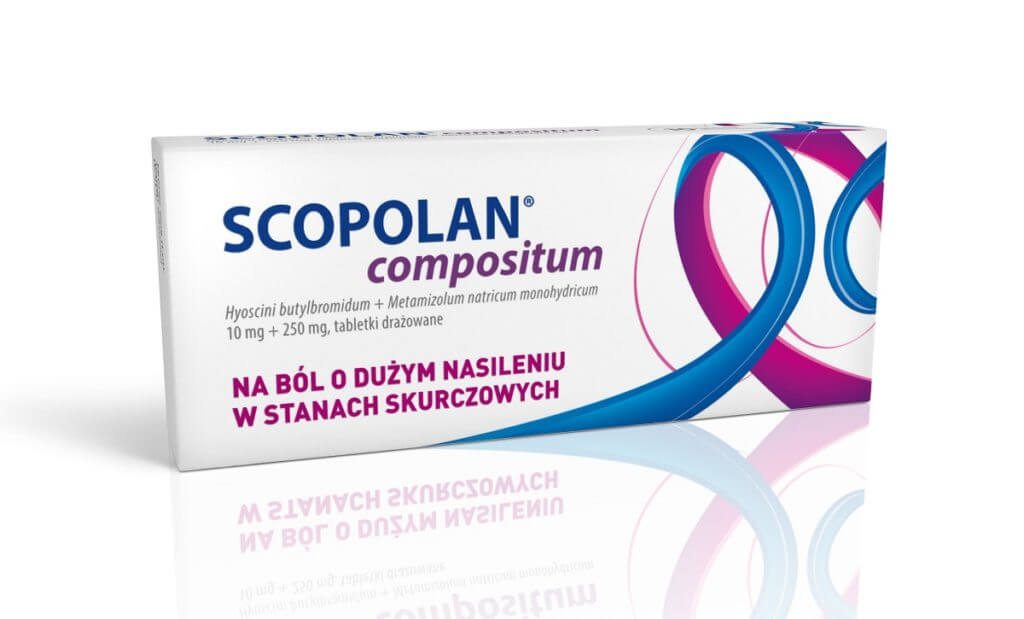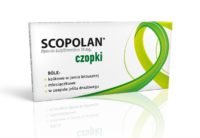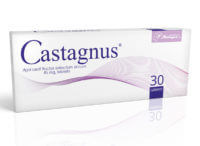
SCOPOLAN ® compositum
coated tablets, OTC drugsScopolan compositum is used for short-term treatment of severe pain in contraction conditions:
- gastrointestinal tract (e.g. stomach cramps, intestinal colic, irritable bowel syndrome),
- biliary tract (e.g. biliary colic),
- genitourinary system (e.g. renal colic, systolic conditions associated with ureterolithiasis, painful menstruation).
Scopolan compositum is indicated in situations where the use of other drugs is contraindicated or ineffective.
Scopolan compositum contains two active substances: hyoscine butylbromide and metamizole sodium monohydrate.
Hyoscine butylbromide cures contraction conditions of smooth muscles in the abdominal cavity. Metamizole sodium monohydrate shows strong analgesic and antipyretic effects and additionally reduces the tension of smooth muscles.
Scopolan compositum reduces painful contractions of the gastrointestinal tract, biliary ducts and the urogenital system.
How to use Scopolan compositum
Always use this medicine exactly as described in the patient package insert or as directed by your doctor or pharmacist. Always use this medicine exactly as described in the patient package insert or as directed by your doctor or pharmacist.
The drug should be used only temporarily (in case of ailments).
Recommended dosage
Adults: orally 1 to 2 coated tablets once.
In case of severe pain, the dosage can be increased by taking 1 to 2 coated tablets up to 3 times a day.
Always use the smallest effective dose.
Do not administer to children and adolescents under 18 years of age.
Do not apply the drug for more than 3 days without consulting a doctor.
If your symptoms intensify despite taking this medicine, you should stop taking this medicine and consult your doctor.
If you have any further questions about the use of this medicine, ask your doctor or pharmacist.
Before you use Scopolan compositum
When not to use Scopolan compositum
Do not use Scopolan compositum if you are allergic to the active ingredients (hyoscine butylbromide, metamizole sodium monohydrate) or any of its other ingredients.
Do not use Scopolan compositum if you suffer from:
- hypersensitivity to pyrazoles and other non-steroidal anti-inflammatory drugs (anti-inflammatory, analgesic and antipyretic drugs),
- allergy to tropane alkaloids (e.g. atropine) and their derivatives,
- changes in blood morphology: leukopenia (small number of leukocytes or white blood cells), granulocytopenia (small number of granulocytes), anaemia,
- congenital deficiency of glucose 6-phosphate dehydrogenase (an enzyme participating in red blood cell metabolism),
- acute hepatic porphyria (disease with severe abdominal pain, vomiting, muscle weakness and pain, and mental disorders),
- acute renal or liver failure,
- narrow angle glaucoma (eye disease with increased intraocular pressure),
- prostate proliferation,
- paralytic intestinal obstruction (stopping the process of intestinal content movement),
- atonic constipation,
- constriction of the esophagus, cardiac orifice or pylorus,
- the narrowing of the bladder neck,
- tachycardia,
- muscle nausea (myasthenia gravis) (a disease with impaired function and significant muscle weakness),
- pathological enlargement of the large intestine (megacolon).
Do not use Scopolan compositum during pregnancy and breastfeeding.
Do not administer Scopolan compositum to children younger than 18 years of age.
Warnings and precautions
The medicinal product should be taken only on an ad hoc basis (in case of complaints) in the recommended indications. Do not apply the drug for more than 3 days without consulting a doctor.
If you have sudden abdominal pain and the cause is unknown and you have fever, nausea, vomiting, changes in bowel movements (e.g. diarrhoea), pain while touching your abdomen, decreased blood pressure, fainting or the presence of blood in the stool, you should not take this medicine without consulting your doctor. In order to investigate the cause of the ailment, the doctor will recommend appropriate diagnostic tests.
You should discuss the use of Scopolan compositum with your doctor if you suffer from:
- reflux disease of the oesophagus (throwing stomach contents into the esophagus),
- ulcerative colitis,
- stomach and duodenal ulcer disease,
- ischaemic heart disease,
- narrowing of the mitral ostium (one of the valves in the heart),
- kidney and/or liver dysfunction,
- hypersensitivity to analgesics, dyspnoea, hives, swelling of tongue, face, lips and/or throat, especially with simultaneous inflammation of sinuses and polyps in the nose,
- bronchial asthma or other allergic diseases, including atopic, chronic urticaria, allergy to pigments (e.g. tartrazine) or preservatives (e.g. benzoates),
- alcohol intolerance manifested by sneezing, tearing eyes and strong facial redness in response to even small amounts of alcohol; this may indicate previously undiagnosed analgesic asthma.
Special care should be taken when using this medicine in elderly patients.
Caution should also be exercised when using the drug in patients with low arterial blood pressure (systolic pressure below 100 mm Hg), dehydrated patients, with high fever and reduced blood volume, patients with heart failure and circulatory disorders, as the drug may reduce blood pressure.
Stop using the drug immediately and call for medical help because of the risk of life threatening in case of sudden symptoms of severe allergic reaction, anaphylactic shock (breathing difficulties, significant drop in blood pressure, sudden swelling, urticaria). The risk of these symptoms is higher in patients with intolerance to other painkillers, certain dyes (e.g. tartrazine) and preservatives (e.g. benzoates), asthma (especially if accompanied by polyphagous inflammation of the nasal and sinus mucosa), atopy, chronic hives and alcohol intolerance (manifested by sneezing, tearing and strong redness of the face after even a small amount of alcohol). Special care should be taken when taking this medicine by these patients.
Stop using the drug immediately and consult a physician immediately in case of the following symptoms:
– agranulocytosis (a significant decrease in the number of defence cells in the blood, the first signs of which may be the symptoms of infection such as suddenly appearing fever, shivers, pain in limbs and joints muscles, deteriorating general condition, pain, inflammation and ulceration of the oral cavity mucosa, throat, genitals),
– thrombocytopenia (a decrease in platelet count, manifested e.g. by petechiae on the skin and mucous membranes, recurring bleeding from gums, nose, gastrointestinal tract),
– pancytopenia (significant reduction in the number of all blood cells: red and white blood cells and platelets, the signs of which are: deteriorating general condition, weakness, symptoms of infection, fever, petechiae and recurrent bleeding, pale skin).
Stop using the drug immediately and immediately report to a doctor in case of symptoms of severe skin reactions, in the form of blisters and erosions on the skin and mucous membranes of the oral cavity, genitals, conjunctiva, accompanied by fever and joint pain. Thoroughly check your skin for these symptoms.
If you experience any of the above symptoms, do not use the drug again.
In case of any visual acuity disorders or eye pain caused by increased intraocular pressure, stop taking the drug and consult a doctor.
Due to the possibility of reducing sweat secretion, the drug should be used with caution in patients with fever.
Children and adolescents
Do not administer to children younger than 18 years of age.
Scopolan compositum and other drugs
Tell your doctor or pharmacist about all the medicines you are currently or recently taking, as well as the medicines you plan to take.
The drug should not be used simultaneously with other drugs from the group of pyrazolone and pyrazolidine derivatives (propyphenazone, aminophenazone, phenylbutazone, oxyfenbutazone). These are drugs with analgesic, antipyretic and anti-inflammatory effects.
Before you start taking Scopolan compositium, you should consult your doctor if you are taking:
- tricyclic antidepressants, e.g. clomipramine, amitriptyline,
- monoamine oxidase inhibitors (MAOs), e.g. selegiline, moclobemide, (some drugs used to treat depression and Parkinson’s disease),
- bupropion (a drug used in the treatment of addictions and depression),
- neuroleptics (antipsychotics) from the group of phenothiazine derivatives e.g. Chloropromazine as well as clozapine and olanzapine,
- barbiturates, e.g. phenobarbital (used e.g. in epilepsy) and glutethimide,
- phenytoin (anticonvulsant),
- some antihistamines (anti-allergic drugs), e.g. dimenhydrinate, klemastine,
- amantadine (a drug used to treat Parkinson’s disease),
- anticoagulants (e.g. warfarin, acenocoumarol),
- dysopyrimide (an antiarrhythmic drug used to treat irregular heartbeat),
- other cholinolytic drugs such as ipratropium or tiotropium (drugs used to treat chronic obstructive pulmonary disease) or other similar to atropine,
- oral diabetes drugs,
- drugs blocking dopamine receptors, e.g. metoclopramide (a drug used to treat stomach disorders),
- beta-adrenergic drugs (used to treat dyspnoea and asthma),
- sulfonamides (antibacterial drugs),
- non-steroidal anti-inflammatory drugs, ibuprofen, acetylsalicylic acid,
- pethidine (a drug used in severe and prolonged pain),
- methotrexate (a drug used in cancer and autoimmune diseases),
- allopurinol (a drug that reduces the production of urate and/or uric acid),
- cyclosporine (a drug that prevents, among other the rejection of grafts).
In case of using pyrazolone derivatives, which include metamizole, the effectiveness of drugs reducing arterial and diuretic pressure (captopril, triameter) and lithium may change. There is no information as to whether metamizole also causes such interactions.
Using Scopolan compositum with alcohol
Do not drink alcohol while taking this medicine. Alcohol used together with the drug increases the risk of serious side effects.
Pregnancy, breastfeeding and effects on fertility
The drug should not be used during pregnancy and breastfeeding.
The effect on fertility is not known.
Driving vehicles and operating machinery
Scopolan compositum may cause impairment of psychophysical fitness and visual impairment, therefore patients should not drive vehicles or operate machines during treatment.
Scopolan compositum contains sucrose
If you have previously been diagnosed with intolerance to certain sugars, you should consult your doctor before taking this medicine.
Possible side effects
Like all medicines, Scopolan compostium can cause side effects, although not everyone gets them.
Adverse drug reactions are presented according to organ and system classification and frequency: not very common (affects less than 1 in 100 patients but more than 1 in 1000 patients); rare (affects less than 1 in 1000 patients but more than 1 in 10 000 patients); very rare (affects less than 1 in 10 000 patients); unknown (cannot be determined from available data).
During administering the Scopolan compositum may occur:
skin and subcutaneous tissue disorders: erythema, skin burning, itching, urticaria, swelling – not very common; severe skin reactions: Stevens-Johnson syndrome (severe allergic disease with blisters and erosions on the skin and mucous membranes of the oral cavity, genitals, conjunctiva, accompanied by fever and joint pain), toxic epidermal necrolysis (TEN, Lyell’s disease, a severe allergic disease with exfoliating blisters and necrosis leading to large areas of epidermis, accompanied by fever and joint pain) – very rare;
stomach and intestinal disorders: dry mouth, nausea, vomiting, constipation – not very often;
cardiac disorders: tachycardia (heart rate acceleration) – not very common;
vascular disorders: hypotension (hypotension) – not very common;
renal and urinary tract disorders: kidney damage, anuria (urinary retention) – rare;
eye disorders: visual disturbances – rare;
blood and lymphatic system disorders – damage to the hematopoietic function of bone marrow – very rarely leading to:
– agranulocytosis (significant decrease in the number of defence cells in the blood, the first signs of which may be the symptoms of infection, e.g. suddenly appearing fever, shivers, pain in limbs and joints muscles, deteriorating general condition, inflammation and ulceration of the oral cavity mucosa, throat, genitals),
– thrombocytopenia (a decrease in platelet count, manifested e.g. by petechiae on the skin and mucous membranes, recurring bleeding from gums, nose, gastrointestinal tract),
– anaemia (decrease in red blood cell count and haemoglobin value, manifested by pale skin layers, weakness),
– pancytopenia (significant reduction in the number of all blood cells: red and white blood cells and platelets, the signs of which are deteriorating general condition, weakness, symptoms of infection, fever, petechiae and recurrent bleeding, pale skin).
In severe cases, these complications can result in death.
disorders of the immune system: anaphylactic (allergic) reactions, anaphylactic shock (sudden and severe allergic reaction characterized by difficulties in breathing, significant drop in blood pressure, swelling, rash) – unknown frequency;
liver and bile ducts disorders: liver damage – unknown frequency.
In case of any of the above mentioned symptoms, discontinue use of the drug immediately and consult a doctor.
Storage of the drug
Store in the temperature below 25°C.
Store the drug out of sight and out of reach of children.
Do not use this medicine after expiry date stated on the package. Expiry date means the last day of the month.
Composition
The active substances of the drug are:
Hoscine butylbromide (Hyoscini butylbromidum) – 10 mg Sodium metamizol monohydrate (Metamizolum natricum monohydricum) – 250 mg
The excipients are: sucrose, talcum powder, potato starch, gum arabic, gelatin, glycerol, magnesium stearate, titanium dioxide (E 171).
Package size: 10 coated tablets



